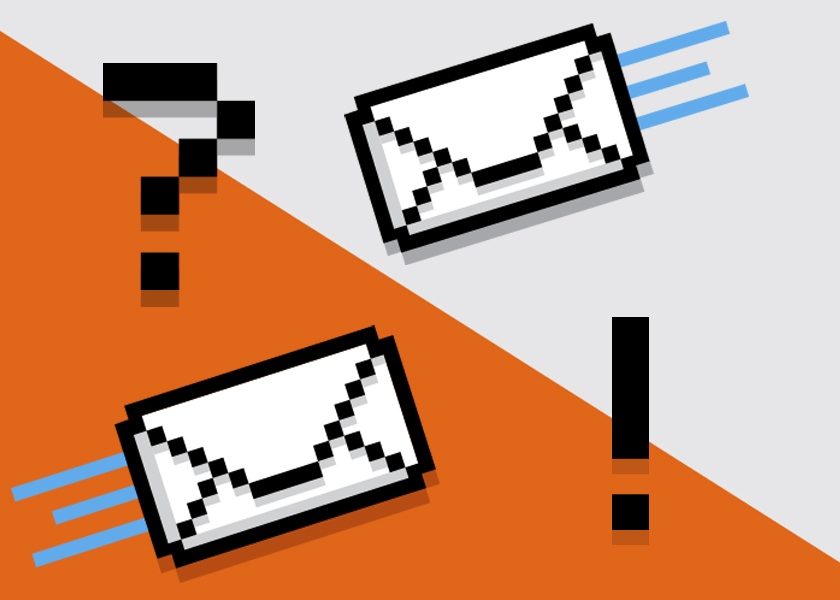- Home |
- Search Results |
- The debate: should you research a book before reading?

From: Stephen Carlick
To: Matt Blake
Subject: Pre-reading research
Hey Matt,
I’m really glad I decided to pay you a visit the other day. Staying two metres away was odd, but it was a beautiful day, the lagers were lovely, and I’d say we “stayed alert” – though it could be clearer what that means, couldn’t it?
Anyway, have you had a chance to start reading Nineteen Eighty-Four yet? I’m certain you’ll like it – it’s a classic for a reason. You certainly seemed primed when I dropped it off, too. What was it you said, something about “Eric Arthur Blair” and democratic socialism? Had you been on George Orwell’s Wikipedia? You knew more about him than I do, and I’ve read Nineteen Eighty-Four about as many times.
I think you’ll find plenty to love if you just let the novel unfold, mate. Everything you need to know is in the pages!
Yours with suspense,
Stephen
From: Matt Blake
To: Stephen Carlick
Subject: Re: Pre-reading research
Hi Stephen,
It was wasn’t it? And thanks for stopping by – I’ve wanted to get more into Orwell’s writing ever since I read about his knuckle tattoos. One of his friends described them as “blue spots the shape of small grapefruits – one on each knuckle.” He got them during his time as a military policeman in Burma, apparently; he said because rebellious Burmese tribesmen thought tattoos gave magic protection from British bullets. As he got more rebellious himself, and disillusioned with the British Empire’s “corruption and imperial bigotry,” he thought it might give him some protection from the establishment.
You’ll find plenty to love if you just let the novel unfold
Anyway, to be honest I’ve not started it yet as I’ve been brushing up on my Orwell knowledge before diving into the book. Maybe it's needy, but knowing an author – where they’re from, what they think/thought about their world – feels crucial to me before I read their books. I've said it before, but knowing who I’m reading helps me understand what I’m reading. Their life is bound to inform their work, and I like to know how, heading into the opening line. Does that make sense?
Knowledgeably,
Matt
From: Stephen Carlick
To: Matt Blake
Subject: Re: re: Pre-reading research
Matt,
Wow, thorough! That does make sense, but I’m of two minds here. On the one hand, it’s fascinating to find these things out about Orwell; on the other, I feel a bit like you’re robbing yourself of the joys of discovering an author through their work, rather than the other way around.
Have you ever watched a friend act in a play (or, if you’re fancy, TV or movies), and found it difficult to discern whether they’re a good actor or not? At times, it’s hard to lose yourself in the performance because you can’t forget that it’s just your friend Alex up there, with leggings or a funny hat on. I get the impulse to situate a work within its context, but occasionally, isn’t it fun to be surprised and gripped by a novel you had no preconceptions about? There’s no need to separate the artist from the art, because the art, at least for those shining moments you spend with it, stands alone.
The thrill of finding out more about the author will be waiting for you after you finish the book, I promise: leggings, funny hat, knuckle tattoos and all.
What if we just try it? Next weekend, I’ll swing by with another classic, a surprise – then you go into it blind. Worth a try?
What do you say?
Challengingly yours,
Stephen
For me, knowing who I’m reading helps me understand what I’m reading
From: Matt Blake
To: Stephen Carlick
Subject: Re: re: re: Pre-reading research
I know what you mean about the friend thing – I’ll never see Hamlet in the same light again since my mate Mark’s one-man Edinburgh show about two warring village fromageries, To Brie or Not to Brie.
But anyway, it’s just that for me, the reader-writer relationship is a sacred thing: we pick up books with the promise of their thoughts, ideas and beliefs. It's intimate. The American writer John Cheever once said, “I can’t write without a reader. It’s precisely like a kiss—you can’t do it alone.” I want to exchange ideas over dinner, so to speak, before an author and I share a snog.
But I hear what you’re saying. I know my approach could be constricting. Since I read that Donald Trump’s favourite writer is Ayn Rand, I’ve avoided her books like the plague (not the novel by Albert Camus, though I have read that, and it’s very pertinent right now).
Come round, then, and I’ll give whatever you bring a go. My blind date awaits, I suppose. My lips are (tentatively) pursed.
Yours adventurously,
Matt
Who do you agree with? Let us know at editor@penguinrandomhouse.co.uk or on Twitter.